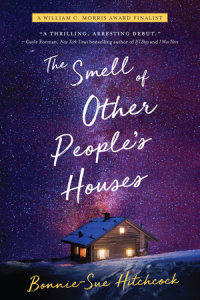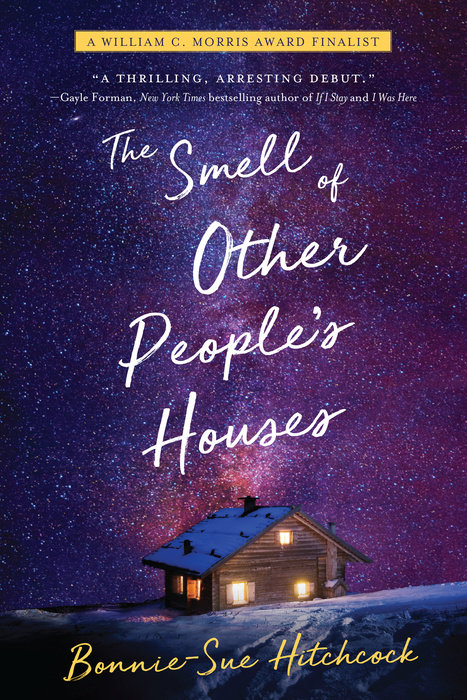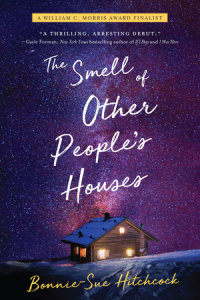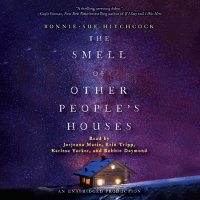The Smell of Other People's Houses
“Bonnie-Sue Hitchcock’s Alaska is beautiful and wholly unfamiliar…. A thrilling, arresting debut.” —Gayle Forman, New York Times bestselling author of If I Stay and I Was Here
“[A] singular debut. . . . [Hitchcock] weav[es] the alternating voices of four young people into a seamless and continually surprising story of risk, love, redemption, catastrophe, and sacrifice.” —The Wall Street Journal
This deeply moving and authentic debut set in 1970s Alaska is for fans of Rainbow Rowell, Louise Erdrich, Sherman Alexie, and Benjamin Alire Saenz. Intertwining stories of love, tragedy, wild luck, and salvation on the edge of America’s Last Frontier introduce a writer of rare talent.
Ruth has a secret that she can’t hide forever. Dora wonders if she can ever truly escape where she comes from, even when good luck strikes. Alyce is trying to reconcile her desire to dance, with the life she’s always known on her family’s fishing boat. Hank and his brothers decide it’s safer to run away than to stay home—until one of them ends up in terrible danger.
Four very different lives are about to become entangled. This unforgettable William C. Morris Award finalist is about people who try to save each other—and how sometimes, when they least expect it, they succeed.
Praise:
William C. Morris Finalist
Shortlisted for the Carnegie Medal
Amelia Elizabeth Walden Book Award for Young Adult Fiction
Tayshas Reading List—Top 10 List
New York Public Library’s Best 50 Books for Teens
Chicago Public Library, Best of the Best List
Shelf Awareness, Best Children’s & Teen Books of the Year
Nominated to the Oklahoma Sequoya Book Award Master List
Nominated to the Colorado Blue Spruce Young Adult Book Award
“Hitchcock’s debut resonates with the timeless quality of a classic. This is a fascinating character study—a poetic interweaving of rural isolation and coming-of-age.” —John Corey Whaley, award-winning author of Where Things Come Back and Highly Illogical Behavior
“As an Alaskan herself, Bonnie Sue Hitchcock is able to bring alive this town, and this group of poor teens and their families that live there.” —Bustle
An Excerpt fromThe Smell of Other People's Houses
Chapter One
The Smell of Other People’s Houses
Ruth
At some point I stopped waiting for Mama to come back. It’s hard to hold on to a five-year-old dream, and even harder to remember people after ten years. But I never stopped believing there had to be something better than Birch Park, something better than living with Gran.
When I was sixteen Ithought maybe it was a boy named Ray Stevens. His father was a private detective and a hunting guide in the bush. His family had just built a new house on a lake where they parked their floatplane, and in winter they could snow-machine all the way down Moose Creek from their back door.
The Stevenses’ whole house was made of fresh-cut cedar. All of Ray’s clothes smelled like cedar, and it made me sneeze when I got close to him, but I got close anyway.
Cedar is the smell of swim team parties at their house and the big eight-by-ten-inch Richard Nixon photograph that hung in the living room. Cedar is the smell of Republicans. It’s the smell of sneaking from Ray’s older sister’s room (Anna also swam on my relay team; I befriended her out of necessity) and into Ray’s room, where I crawled into his queen-sized bed facing the sliding glass doors that looked out on the lake. How many sixteen-year-old boys had a queen-sized bed? I’m guessing one, and it had sheets that smelled like cedar and Tide, and they held a boy with curly blond hair, bleached from the swimming pool. He was the best diver in the state and I was only on a dumb relay team, but he sought me out anyway. We could have drowned in our combined smells of chlorine and ignorance--guess which part I was?
He knew how to French-kiss, which tasted like a forest of promises once I got used to it. Because I was Catholic, and smelled stiff instead of wild, he promised not to do anything but touch me lightly and only in certain places, where the smell wouldn’t give me away when I went back to my own house, which held nothing but the faint scent of mold in second-hand furniture--also known as guilt and sin.
At the Stevenses’, everything was fresh, like it had just been flown in from Outside, and there were no rules. Their shag carpet was so thick that in the morning I followed my deep orange footprints back to Ray’s sister’s room and pretended I’d been there all night.
I only joined the swim team because ballet hadn’t worked out. Gran was sure that any kind of dancing was just a slippery slope that butted right up to the gates of vanity. In her opinion, there was nothing worse than being vain. Lily and I paid for our vanity little by little. We paid by hiding good report cards, deflecting compliments, and staying out of sight. We paid in the confessional on Sundays. “Forgive me, Father, for I have sinned. I smiled at myself in the mirror today.”
I did that. Once. Felt so good about myself that I smiled into a mirror and twirled and danced as if I held the world in my six-year-old hands. I was going to my first dance class in my fancy pink tutu and my long blond hair was all the way down to my butt. It really was so thick and long that it made this cool scritchy-scratchy noiseacross the mesh fabric of my tutu when I swung my head from side to side. It was the tutu Daddy had bought me Outside. You couldn’t get a tutu like this in Fairbanks, and I don’t think Gran knew that it was special, or she never would have let me have something the other girls didn’t. I was so excited, and as I came up to the studio, I remember another girl and her mom going inside, too. Alyce was wearing a black leotard and plain pink tights. I could tell she was jealous, eyeing my tutu as she held open the door to let me in, and her mother said, “You have the prettiest long hair I’ve ever seen.”
“I know. I’m pretty all over,” I said to her without a second thought.
Alyce’s mother smiled at me, but then her face changed quickly as Gran’s fingers gripped me by the arm and yanked me inside. I didn’t even have time to wonder what I’d said that was wrong. Gran marched me into the bathroom, and said through gritted teeth, “Oh, you think you’re something special, do you?”
She pulled a huge pair of orange-handled scissors out of her bag, as if she carried them around waiting for moments just like this. They looked like a bird with a silver metal beak. And they were loud. I can still hear the sound of my hair being chopped offwith just a few mad snaps of the bird’s jaws. Then Gran made me walk out of the bathroom and go take my place on the piece of tape that Miss Judy put on the floor marking my spot. Nobody looked right at me, but there were mirrors onevery wall, so I could see their sideways glances. I could also see my hairsticking out in all directions, as if it had been caught in a lawn mower. No more swishing for me. I never went back to that class. And Gran never mentioned it again.
Even after all theseyears, I know that a stroke of good luck, like a rich, popular boyfriend whose family likes you, means you just have to hold your breath and hope it lasts--and never, ever brag or feel too good about yourself.
That’s why I stole one of Ray’s white T-shirts and took it home to sleep with under my pillow so I could pretend my world smelled of cedar, too. No one ever suspected anything, because at Birch Park, where the sound of cockroaches chewing saltines is deafening, I just kept my head down and let Lily make all the mistakes.
“Bunny says we’re poor,” Lily announces as she and her best friend, Bunny, clatter through the door,letting in a gust of cold air. They drop their mittens and snowsuits into a big pile and trip out of their boots, knocking each other over trying not to belate for dinner.
Gran is reheating food left over after another Catholic Social Services luncheon. She works part-time typing for the archbishop, so we get first dibs on whatever food is left from their functions. Tonight’s meal was delivered to the door by Father Mike himself, with his little white collar choking him.
Selma is over and we’re setting the table. I can see Gran looking at the food, wondering if it will be enough to feed two extra mouths. She reaches for a can of Spam to stretch it out.
“I didn’t say you were poor. I said you were poorer than me and Dumpling,” Bunny says. Dumpling is her older sister.
I watch Gran sigh, which is a sign that we’re aging her. We’re always aging her, but especially Lily, and now Bunny is helping. Gran says if she didn’t have to take care of us, she’d still be a young woman. I look at her sagging boobs, then down at the tuna casserole. Too bad for Lily, there are peas in it again.
“What makes you so rich?” she asks Bunny as they jostle each other at the sink, fighting over the Joysoap.
“Fish camp,” says Bunny, “We get tons and tons of salmon at fish camp.”
“My cousin goes fishing every summer,” Selma chimes in. “She doesn’t think salmon are so special. In fact, Lily, I’m sure Alyce would trade places with you--she would love not to have fish this summer.”
Selma’s cousin Alyce is the same Alyce from that fateful ballet class. It was her mother who told me my hair was pretty.
“I don’t want to go commercial fishing and have to live on a smelly old boat,” Lily says, as if she’s just been insulted. “I want to go to fish camp like Bunny and Dumpling, near their village.”
“Yeah,” Bunny says, “our camp is way up above the Arctic Circle. We have drumming circles and dances that go on all night, and then we lay our sleeping bags out on spruce boughs and we don’t have to get up until the afternoon if we don’t want to. Me and Dumpling get to shoot mice with BB guns and roast salmon hearts over the fire, too. Better than marshmallows!” She rubs her belly and licks her lips just thinking about it.
I’ll pass on the roasted salmon hearts. But Bunny sounds braggy to me, and I glance over at Gran to see if she’s ruffled by it. She’s spooning food onto plates as if it takes so much concentration. I guess other people’s kids can be vain if they want. Lily better watch out it doesn’t rub off on her.
“Is there mayonnaise in this?” Lily asks.
She is the pickiest eater on the planet.
“Lily,” Gran says in a voice that lets Lily know mayonnaise should be the least of her worries. “Say grace.”
“Blessusolordandtheseourgiftswhichweareabouttoreceivefromthybountythroughchristourlordamenwhy-can’t-we-have-a-fish-camp?” Lily asks, without taking a breath.
Selma looks at me and we roll our eyes. Lily spends her life griping that almost everyone else in Birch Park has a fish camp. But saying it in front of Bunny puts Gran on the spot. It also shows how clueless both Lily and Bunny are if they haven’t figured this one out yet. They’re both eleven, which is plenty old enough know to where the lines are drawn.
“We don’t have a fish camp because we aren’t native,” Gran says, to her plate.
“I’m not native, I’m Athabascan,” Bunny says.
Selma and I laugh.
“What’s so funny? She is Athabascan,” says Lily. “Natives are the people like Dora’s mom, the ones who hang out all day at the bar--they’re too drunk to even bother fishing.”
“That’s enough,” Gran says, slapping Lily so hard on the hand that her fork flies up and then falls with a clatter.
“No more talking while we eat this meal that Father Mike has so generously provided for us.”
Lily pushes her peasaround on her plate. Her cheeks are bright pink.
Fish camps are pretty much handed down from family to family, but maybe Gran shouldn’t have lumped all Alaska Natives together. It didn’t seem to make Bunny very happy. Especially because Bunny and Dumpling actually have the nicest parents in Birch Park. Dora’s family never goes to fish camp. Lily knows better than to gossip about Dora at the table, though.
It’s not as if we all didn’t see what happened the night Dora came running out of her house wearing only a nightgown. Her father, Bumpo, was chasing after her, calling her a whore. Ithink he got the name Bumpo because he’s always drunk and bumping into things. Bunny’s dad, Mr. Moses, was the only person brave enough to go outside and face him. Mr. Moses had a big wool blanket and he scooped Dora up in it like she was just a sack of feathers; then he set her inside the door of his own house. No matter how much Bumpo yelled in his face or threatened him with a beer bottle, Mr. Moses didn’t budge; he just stood there blocking the door that hid Dora.
It went on and on until Bumpo just sort of slumped over, all deflated. Bunny’s father led Bumpo back to his house. And the rest of us went back to pretending we didn’t see anything.
If you’re wondering why nobody called the cops, that would show how little you know about us. Whatever you happen to be--black, white, native, or purple, it doesn’t matter--it’s a sin to snitch. It’s the one universal rule that being poor will buy you, for better or worse.
When Gran gets up from the table and is out of earshot, good old Selma leans in to Lily and says, “I thought the Lord provided the meal, not Father Mike.” All she gets is a halfhearted smile from my sister, who is busy piling her peas onto Bunny’s plate now that Gran isn’t looking.
Bunny eats them all in one bite, because that’s what best friends do. Then they both hop up saying they’re going to Bunny’s for Eskimo ice cream and are out the door before Gran can argue.
Lily has Bunny and I have Selma. And that’s why we haven’t gone totally batshit crazy yet, living with Gran.
Selma is the complete opposite of me. She came into the world in the most unconventional way and must have decided before she was even three days old that she was going to fall in love with her life, no matter what. (It helps that she doesn’t live with someone who might chop off her hair.) Selma has these enormous brown eyes like a seal, and for whatever reason, she doesn’t feel bound by the same rules as the rest of us, which makes her a great friend. But she doesn’t live in Birch Park, and I’m reminded of that when I hear a timid knock at the door, so light that Gran doesn’t hear it in the kitchen.
Selma’s wide eyes are laughing around the edges as she mouths silently, “Alyce.”
Alyce will sometimes drop by and pick Selma up on her way home from ballet. They both live on the other side of the river, where the houses get nicer in a hurry and the rent is much higher.
Alyce is long and lean with high cheekbones. Her hair is pinned perfectly into a bun. She’s wearing leg warmers, too, which might be fine at ballet, but in Birch Park I’m sure anyone who sees her just thinks she cut the sleeves off her sweater and is wearing them on her legs. She always looks terrified when she comes to pick up Selma. I’m not sure what she thinks will happen to her here; all she’s doing is standing on our doorstep.
“Ready to go?” she says to Selma, barely acknowledging me.
The only reason she steps inside is because it’s twenty below on the porch.
“Hi, Alyce,” I say.
“Hi,” she mumbles, looking down at the puddles of melting snow from her boots. “Too bad you missed Lily,” Selma says, as if Alyce cares. “She’d love to talk to you about fishing. Maybe you could convince your dad to take her on as a deckhand and you could get a summer off?”
“Selma--” Alyce looks embarrassed.
“There’s a recruiter coming from one of the top dance colleges this summer,” Selma says to me, “but Alyce can’t get out of fishing with her dad, so she doesn’t get to audition.”
“Selma,” Alyce says, “your mom’s going to be worried. You know how she is; we should go.”



